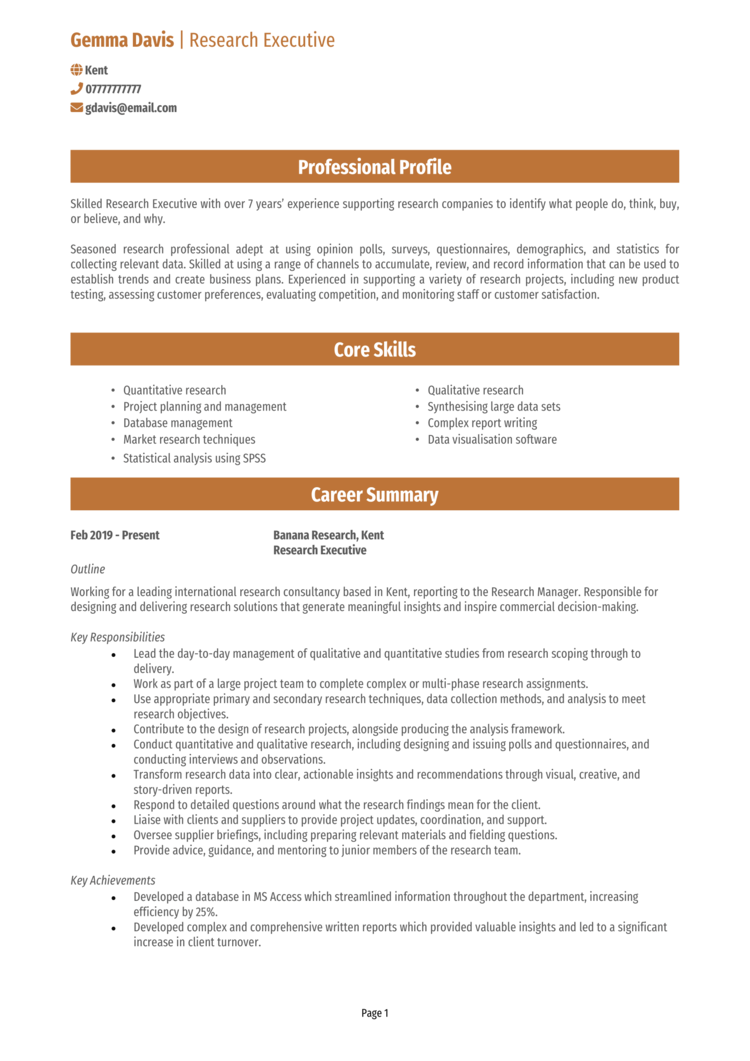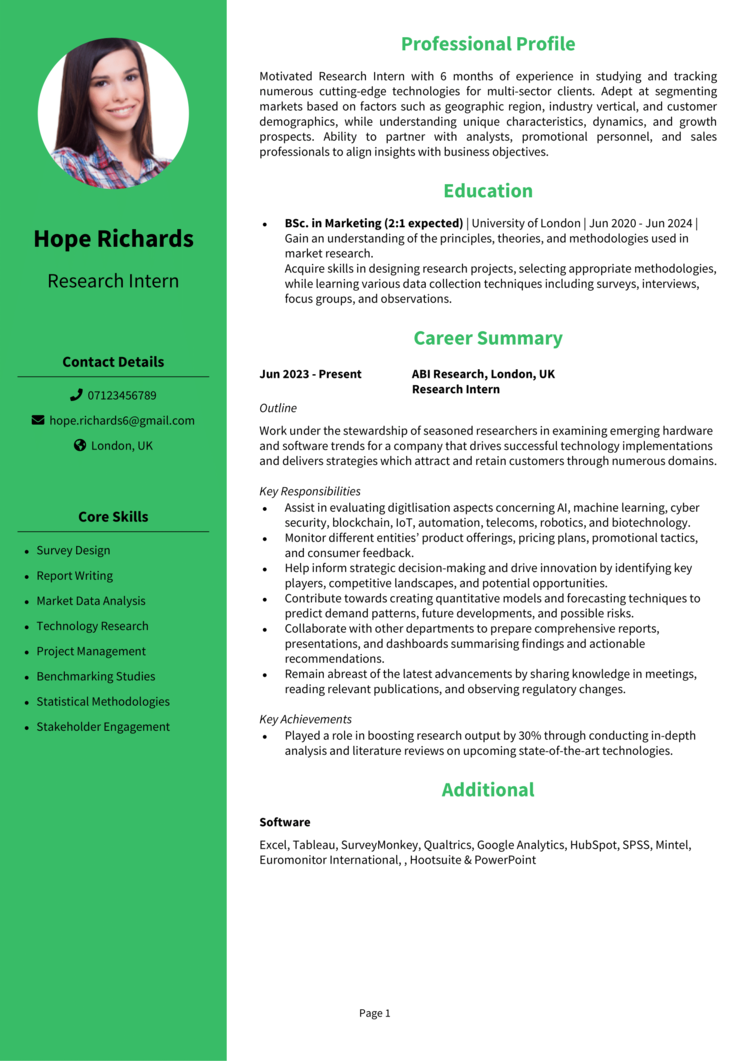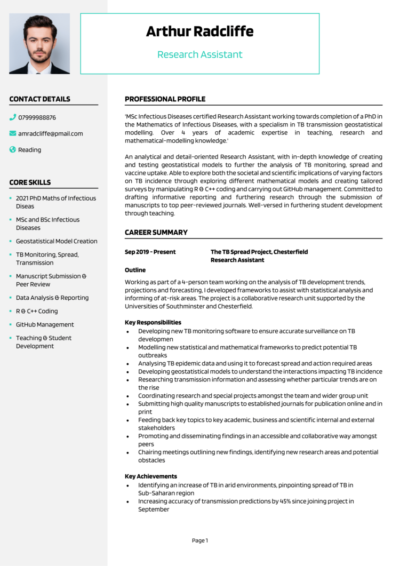Are you ready to dive into data, analyse findings, and support groundbreaking projects? A Research Assistant role could be your perfect match – but first, you’ll need a CV that showcases your keen eye for detail and passion for discovery.
This guide, complete with some Research Assistant CV examples, will help you craft an application that makes hiring managers want to investigate you further. Let’s get you one step closer to your next big research opportunity.
Research Assistant CV example

Research Associate CV example

Research Executive CV example

Research Intern CV example

Research Internship CV example

How to write your Research Assistant CV
Learn how to create your own interview-winning Research Assistant CV with this simple step-by-step guide.
A Research Assistant CV needs to do more than list your qualifications. It should demonstrate your ability to conduct research, manage data, and contribute meaningfully to academic or professional projects.
This guide will walk you through writing a CV that captures your analytical expertise, academic achievements, and ability to thrive in a research environment.
Research Assistant CV structure


Your CV structure needs to be as clear and concise as a research abstract – and tell recruiters what you’re all about. A clear structure helps hiring managers quickly spot the skills and experience that make you the right fit.
Here’s how to structure your Research Assistant CV:
- Name and personal details – These contact details go at the top, making it easy for organisations to reach you. Including a picture of yourself is optional.
- Profile – Kick things off with a quick summary of your research experience, technical skills, and key achievements.
- Core skills – Next, bullet point abilities like data analysis, report writing, and statistical modelling.
- Work experience – Share your roles in reverse chronological order, focusing on research projects.
- Education – Emphasise youe academic qualifications, research-focused coursework, and certifications.
- Additional info – In a separate optional section, you can mention hobbies and interests that reflect analytical thinking or curiosity.
Research Assistant CV format


A messy CV format is like sloppy data collection – frustrating to navigate and a surefire way to lose credibility. Keep it clean, logical, and worthy of peer review. Keep the layout professional and easy to read, so your expertise takes centre stage, rather than formatting mistakes.
Here’s how to format your Research Assistant CV effectively:
- Bullet points – Use these to break down key responsibilities and achievements for clarity.
- Divide sections – Organise your CV with clear headings to guide the reader.
- Use a clean font – Select a professional, readable font to keep your CV polished.
- Keep it the right length – Two pages are ideal, giving enough length to detail your experience without overwhelming the recruiter.
Creating a strong Research Assistant CV profile


Your profile (or personal statement, for junior candidates) is your hypothesis: it sets the tone for what recruiters can expect, and if it’s compelling enough, they’ll want to read the full study (a.k.a. your CV). It needs to introduce you and show why you’re the ideal candidate for a research role.
Research Assistant CV profile examples
Profile 1
Dedicated Research Assistant with three years of experience supporting academic studies in environmental science. Skilled in data collection, statistical analysis using SPSS, and preparing reports for publication. Contributed to research projects that informed sustainable policy initiatives.
Profile 2
Organised Research Assistant with two years of experience in clinical research, specialising in patient data management and regulatory compliance. Proficient in conducting literature reviews, maintaining accurate records, and collaborating with multidisciplinary teams to ensure project success.
Profile 3
Experienced Research Assistant with over five years of expertise in social science research, focusing on survey design, qualitative data analysis, and policy evaluation. Skilled in using NVivo and Tableau to present findings that influenced key decisions in public sector projects.
What to include in your Research Assistant CV profile
Here are some tips on what to include in your Research Assistant CV profile:
- Where you’ve worked – Note the sort of institutions, labs, or projects you’ve contributed to.
- Your top qualifications – Clearly highlight degrees and certifications relevant to research.
- Specialised skills – List off some technical skills like statistical software or laboratory techniques.
- Research focus – Mention specific areas of interest or study, such as molecular biology or social sciences.
- Impactful contributions – Quickly mention any significant findings or results you’ve helped achieve, and awards they’ve earned you.
Core skills section


The CV skills section is your research toolbox – a snapshot of your abilities, from crunching numbers to making sense of messy datasets. It’s where you quickly showcase the abilities that make you a standout Research Assistant. Tailor this section to the job description, focusing on technical skills and relevant experience.
What are the most important skills for a Research Assistant CV?
- Literature Review Expertise – Conducting thorough reviews of academic literature to identify gaps and inform research objectives.
- Data Collection – Designing and executing data collection processes, including surveys, experiments, and fieldwork.
- Statistical Analysis – Applying statistical methods and tools like SPSS, R, or Excel to analyse research data effectively.
- Report Writing – Preparing detailed reports, summaries, and research papers for academic or institutional use.
- Research Methodology – Designing and implementing robust qualitative or quantitative research methodologies.
- Grant Proposal Preparation – Assisting in writing grant applications to secure funding for research projects.
- Laboratory Techniques – Performing standard lab procedures, maintaining equipment, and ensuring compliance with safety protocols.
- Data Visualisation – Creating graphs, charts, and presentations to communicate research findings clearly.
- Ethics Compliance – Ensuring research adheres to ethical guidelines, including informed consent and data confidentiality.
- Collaboration and Coordination – Working with research teams, faculty, or external collaborators to achieve project goals efficiently.
The best way to present work experience


Your work experience section is where you prove your practical contributions to past research projects. Listing your past job history in reverse order, put more emphasis on your most recent and relevant roles.
If you’ve not got much experience, feel free to emphasise things like part-time work placements and volunteering.
How to structure jobs

- Outline – Provide a brief description of the institution or project and your role.
- Responsibilities – Highlight key tasks, such as data collection, analysis, or presenting findings.
- Achievements – Make sure to include measurable outcomes, like published papers or successful experiments in your CV.
Example jobs for Research Assistant
Research Assistant | GreenEarth Initiative
Outline
Supported environmental research projects for a leading non-profit organisation, focusing on climate change and biodiversity studies. Assisted in data analysis and report preparation to inform policy recommendations.
Responsibilities
- Collected field data on biodiversity metrics and environmental conditions across multiple sites.
- Conducted statistical analysis using SPSS to identify trends and correlations.
- Prepared literature reviews to provide context for ongoing research projects.
- Drafted reports and presentations for internal and external stakeholders.
- Collaborated with team members to develop proposals for additional research funding.
Achievements
- Contributed to a published paper on habitat restoration that influenced local policy.
- Reduced data processing time by 20 percent through efficient use of analytical tools.
- Recognised by supervisors for meticulous data management and attention to detail.
Research Assistant | CareFirst Clinicians
Outline
Assisted in clinical research for a healthcare organisation, focusing on trials for new treatments in oncology. Supported data collection, compliance documentation, and patient communications.
Responsibilities
- Managed patient records and ensured accurate data entry into trial databases.
- Conducted literature reviews to support the development of trial protocols.
- Prepared regulatory documents to ensure compliance with ethical standards.
- Facilitated communication between patients, clinicians, and research teams.
- Organised trial materials and ensured availability for scheduled study visits.
Achievements
- Improved data accuracy by 15 percent through rigorous cross-checking procedures.
- Contributed to the successful completion of two Phase II clinical trials ahead of schedule.
- Recognised for maintaining compliance during a key regulatory audit.
Research Assistant | InSight Policy
Outline
Supported social science research for a public policy think tank, focusing on education and workforce development studies. Provided qualitative and quantitative analysis to inform policy recommendations.
Responsibilities
- Designed and distributed surveys to collect data on workforce training programs.
- Conducted interviews and focus groups to gather qualitative insights.
- Analysed data using NVivo and presented findings through detailed visualisations in Tableau.
- Authored sections of policy briefs and reports for dissemination to stakeholders.
- Collaborated with external partners to align research goals with organisational objectives.
Achievements
- Improved survey response rates by 25 percent through targeted outreach strategies.
- Contributed to a policy report adopted by a government agency to improve training initiatives.
- Recognised for delivering high-quality analysis under tight deadlines.
Writing your education section


The education section is crucial for Research Assistant roles, as it demonstrates your academic foundation and research training.
Include degrees, research-focused coursework, and any certifications that showcase your readiness for the role. Highlight achievements like theses, presentations, or high grades in relevant modules.
Always list qualifications in reverse chronological order, starting with the most recent.
Most valuable qualifications for Research Assistants
- Bachelor’s Degree in your field – Provides foundational knowledge and research skills in your area of expertise.
- Master’s Degree in your specialisation – Demonstrates advanced understanding and dedication to a specialised field of study.
- Research Ethics Certification – Highlights knowledge of ethical practices in conducting research.
- Data Analysis Tools Certification – Validates proficiency in tools like SPSS, R, or Python for data analysis.
- Grant Writing Workshop – Equips you with skills to secure funding for research projects.





